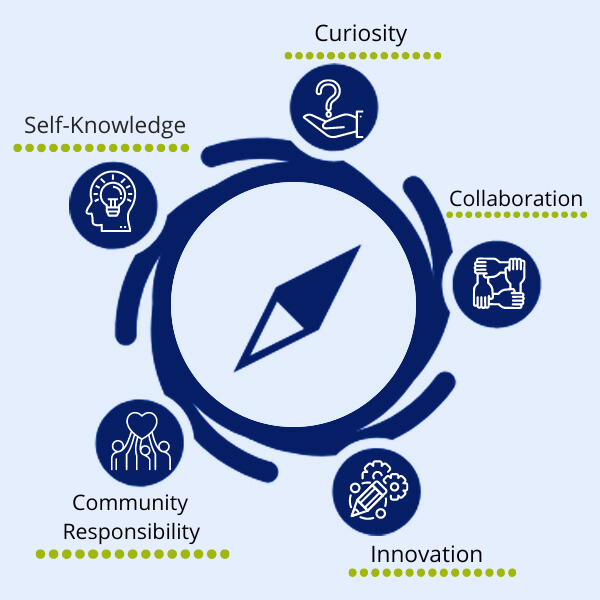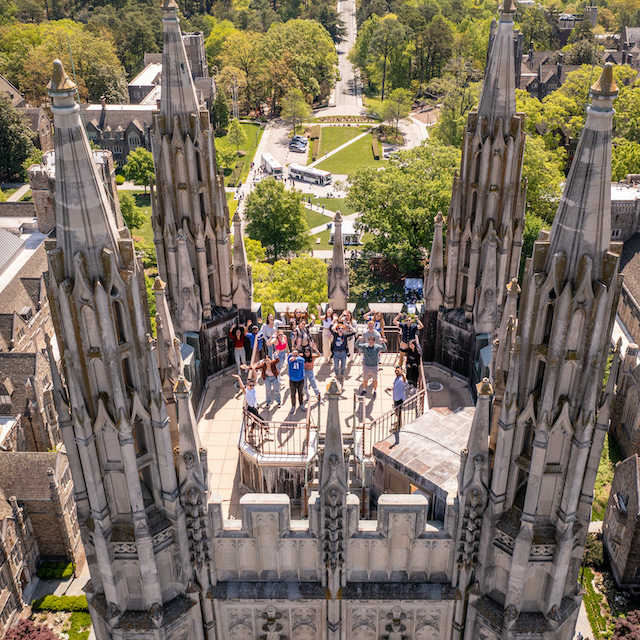Leadership development and student groups are the cornerstones of the Student Involvement and Leadership team. Connect with our team to learn about opportunities to get involved on campus and ways to grow as a leader.
The staff of the Student Involvement and Leadership team serves in an advisory capacity to Duke University Union, Duke Student Government, fraternities & sororities, and a variety of other groups.
Mission
Student Involvement and Leadership helps students co-create Duke experiences that enhance their sense of belonging through meaningful programming, advising, and training.
Values
Driven by our students, our team, and our greater community, Student Involvement and Leadership values compassion, trustworthiness, inclusion, knowledge, and fun.
Below are the leadership competencies that Student Involvement and Leadership uses when designing events, trainings, and workshops.
Adapted from the Social Change Model of Leadership Development (1994) and the Culturally Relevant Leadership Framework (2016)

- Self-Knowledge (internal character focus)
Student is aware of how they are perceived by others; this knowledge of self is informed by both their identity and society and they know how this informs their practice of leadership. Student is aware of their own power and privilege and how this impacts their leadership and relationships.
Student possesses confidence and efficacy with self-awareness and makes commitments that are prioritized appropriately. Student is aware of the scope of their competence and knows where their expertise lies.
Student practices congruence of their values with behaviors demonstrating integrity and high personal standards. When an internal conflict of values arises, student understands how to navigate that dissonance.
Student understands that leadership is not positional. Leadership is integrated into student’s own identity.
- Curiosity (external character focus)
Student understands and exhibits healthy risk taking, showing humility, courage, and interest in learning about others’ identities and experiences.
Student exhibits self-assurance that they have positive qualities balanced with a focus on continuous improvement of self; regularly seeks feedback and learns from failure.
Student asks for help or connects with others when faced with challenges.
Student knows how to navigate cross-cultural spaces, how to be curious in those spaces and understands the impact of their identity within those spaces.
- Collaboration
Student practices effective communication, as appropriate to the situation.
Student values and knows how to build belonging in a group.
Student has skills in organizational management including motivating a group around a common purpose, navigating controversy or conflict with civility, including and valuing diverse voices, and ensuring equal and equitable contribution from all members. Student both exhibits and facilitates sharing of ideas and distribution or delegation of responsibilities across team members.
Student is able to discern collaborations or partnerships that make sense for the topic and builds quality collaboration from idea inception.
Student is able to examine themes of power and privilege to understand how it impacts group behavior.
- Innovation (internal community focus)
Student exhibits understanding of change process and practices change management skills towards positive change. This includes practicing coalition building and activism informed by actual needs and root cause.
Student advocates for an asset-based approach to change work.
Student understands the historical legacy of inclusion and exclusion in their communities. Student includes and values diverse voices and experiences in order to achieve quality and sustainable change.
- Community Responsibility (external community focus)
Student values social responsibility, working towards and with groups, causes, and communities they care about. Student does this work with a level of selflessness, not to build their own ego or resume.
Student understands the interconnectedness of experiences and uses this to foster a climate of belonging.
Student understands the impact of the historical legacy of inclusion/exclusion and how this shapes existing organizational structures.
Student understands the context of time, place, and manner, and knows how to use this to support the community in the ways it needs.
Our Team
Trying to find us? Our team works on a hybrid schedule so email is likely the best way to contact us.
Anna Lehnen (she/her)
Director
Contact Anna for information about office policies and procedures, strategic vision for Student Involvement and Leadership, Duke True North Leadership program, and Student Involvement and Leadership QuadEx initiatives.
Lamar Walker (he/him)
Associate Director
Contact Lamar for information about student organizations (recognition, contracts, policies, and event registration) and the Duke Groups platform.
Sam Lopez (she/her)
Associate Director
Contact Sam for information about the Penny Pilgram George Women's Leadership Initiative, Project Lead, and Fraternity & Sorority Life.
Michael Croal (he/him)
Assistant Director
Contact Michael for information about Duke University Union (DUU), DUU events, and the Wetherby Fund.
Juwan Jacobs (he/him)
Assistant Director
Contact Juwan for information about Duke Student Government, the Next Level Leadership Series, and the Duke delegation for the ACC Leadership Symposium.
LaKeya Francis (she/her)
Assistant Director
Contact Keya for information about student organizations (starting a new student group, storage, and event registration), the Next Level Leadership Summit, WXDU, Duke Coffeehouse, Small Town Records, Freewater Productions, and Duke Student Broadcasting.
Alexis Harp (she/her)
Assistant Director
Alexis works the Multicultural Greek Council, the National Pan-Hellenic Council, and the Penny Pilgram George Women's Leadership Initiative.
Mercedes Jones
Graduate Assistant
Mercedes works with office leadership initiatives including the Penny Pilgram George Women's Leadership Initiative.

Contact Us
Email:
leadership@duke.edu
Mailing:
Box 90834
Durham, NC 27708
Physical:
Bryan Center, Suite 101
125 Science Drive
Durham, NC 27708